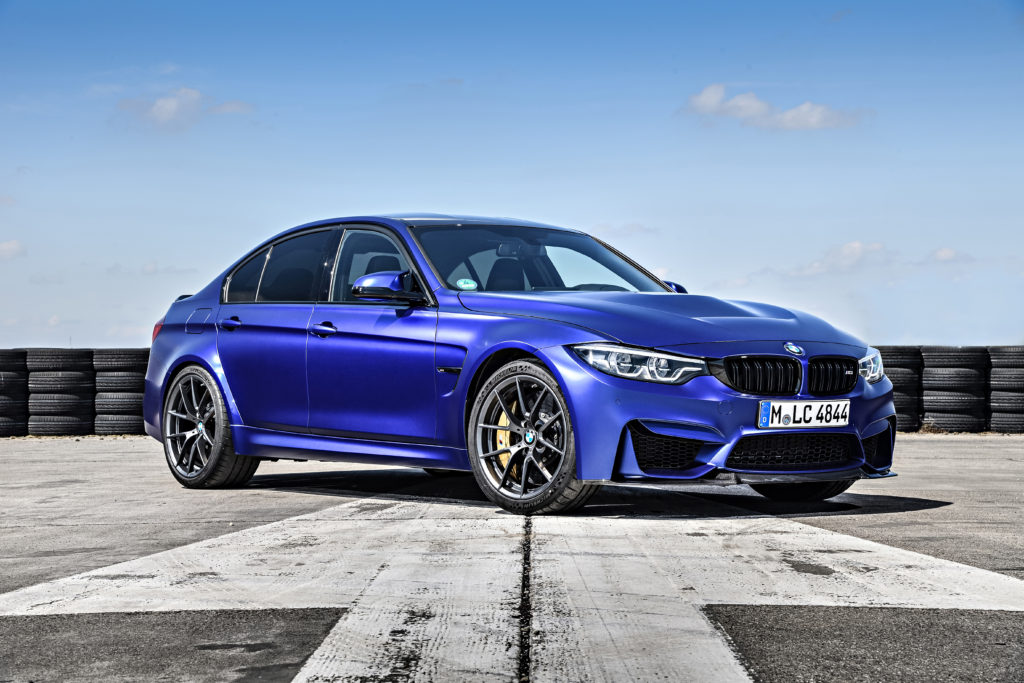In what’s likely to be the last specialized variant of the F80 M3 before the platform ceases production, BMW has introduced a sharpened model with elevated performance. Production of the M3 CS will be limited to 1,200 units worldwide, with estimates that range from 500 to 550 of those set aside for the U.S. market.
Customers have been able to place advance orders for the M3 CS since January, while manufacturing began in March. Now, just ahead of the first examples arriving, BMW has released full details relating to the specifics of the car (which had previously made the rounds at various auto shows). Built to fill the gap in the lineup above Competition Package-equipped M3’s, the specialized components which comprise that option group seem to have largely been used as the basis for the new Competition Sport model, but the enhancements go expectedly further than before. In addition to every example coming standard with M Driver’s Package, the standard transmission choice is a seven-speed M DCT with a dedicated oil cooler.
Official photos of the new model focus on an example finished in Frozen Dark Blue paint, which to some observers seems to display a transformative quality under sunlight not often found in similar matte tones. Setting things apart from a garden-variety M3 is an aero package made up of a trunk-lid-mounted Gurney spoiler, along with a low-slung front splitter and rear diffuser, all of which are functional in terms of reducing what BMW refers to as dynamic lift. Light-alloy Y-spoke wheels wear a design similar to that of other recent high-performance offerings from the manufacturer, and come standard wrapped in Michelin Pilot Sport Cup 2 rubber—however, more tame, street-friendly shoes from Michelin are optionally available. In addition to the carbon-fiber-reinforced plastic (CFRP) roof, the hood is also made from the same material.
Suspension geometry and ride height are said to largely follow the Competition Package. Wheel-carriers and links at both ends employ forged aluminum in their construction for precise control and substantial weight savings, while Adaptive M suspension is standard. DSC, the Active M differential, electric power steering, and various other systems have all been specifically tuned and modified to suit the specific changes and requirements of the M3 CS—and drivers may customize their own personal preferences as well.
The cabin of the M3 CS also bears a few unmistakable features which differentiate it from the standard M3. Alcantara has been used extensively and shows up on the steering wheel and trim, which uses contrasting stitching for the center console and CS lettering on the instrument panel. Upholstery uses an eye-catching combination of Silverstone and black leather with the same stitching continued on the door handles, instrument-cluster binnacle, and elsewhere, while the seats themselves are said to save weight over the regular design. Harman/Kardon premium surround sound is standard, along with features we’ve come to expect in the U.S., such as automatic climate control and iDrive navigation system.
Although the F82 M4 coupe is scheduled to soldier on in terms of production, thanks to its ability to comply with the new need for a particulate filter integrated with the exhaust, the M3 would not be able to accommodate the new regulations without a complete underside redesign. Production of the F80 platform will cease in June, which leaves a significant gap between the time inventory runs out and the time the next generation becomes available.
In addition to a new S58 power plant based on the current B58 engine, sources also indicate that the next M3 will drop the beloved, lightning-fast—but incredibly complex—dual-clutch transmission for an eight-speed ZF which uses a conventional torque-converter design, like that found in the F90 M5.
But before the new car comes to market, BMW has sought to give the S55 and F80 platform a fitting sendoff in the M3 CS. The regular M3 develops 431 horsepower from 5,500 to 7,300 rpm with 405 pound-feet of torque available between 1,850 and 5,500; the Competition Package dialed things up slightly, with 450 horses at 7,000 rpm and a nearly identical torque band with a single additional pound-foot added. The S55 in the M3 CS, by contrast, puts out 460 horsepower at a friendly 6,250 revs, while torque has been juiced with 442 pound-feet available from 4,000 to 5,380 rpm.
The six-speed manual which was formerly standard across the range is gone, in favor of a highly appropriate seven-speed M double-clutch transmission (M DCT) with Drivelogic, which also benefits from an additional oil cooler. The sprint from a dead stop to 60 mph has benefited marginally but proportionately; after all, it’s easy to forget how hard it is to move the needle at the blistering levels of performance offered by today’s range.
Although production is limited to 1,200 units for the entire world, with between 500 and 550 of those reserved for the U.S., BMW M says that a handful still remain available. Prices start at $97,400—that’s $30,900 above the base price of the standard unit, or $38,500 more than the base price of the M2 Competition which will go on sale this July.
But remember, they’re only making so many. If you want the absolutely sharpest and most potent factory version of the F80 M3, this is it.—Alex Tock
[Photos courtesy of BMW AG.]
